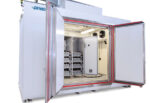Designers have choices and tradeoffs when choosing the ideal Li-ion battery chemistry. Batteries affect the cost, lifetime, and usefulness of an application. An optimal energy storage system is critical to ensure the life and performance of an application, so it’s essential to start with the best battery chemistry for the job. This FAQ reviews six…
lithiumion
What are the top five Li-ion battery safety standards?
Lithium-ion batteries (LIBs) are complex electrochemical and mechanical systems that are the subject of dozens of international safety standards. In this FAQ, we’ll discuss the key environmental aspects of LIB safety, review the top 5 LIB safety standards, and consider the use of custom-battery testing rooms for the safety of testing personnel. Many of the…
How fast can Li-on batteries be charged?
The speed at which a battery can be recharged is measured using the ‘C-rate,’ where ‘C’ is the battery’s capacity in mA or A. At a 1 C rate, a battery can be completely recharged in one hour. The speed of charge primarily depends on the voltage. For example: For small batteries used in portable…




